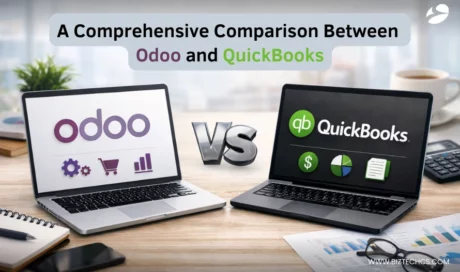2423
Custom ERP for Schools & Universities: Why Education Needs Tailored Solutions
7 min read
2423
7 min read

Today, educational management implements custom ERP software to improve institutional efficiency and students’ experiences. A study shows that over 30% of schools and universities have implemented ERP systems to improve management efficiency.
These solutions offer all the functions, such as administrative, academic, finance, and student records, all in one place. Custom ERP solutions enable institutions to develop a system that meets their requirements and enhances the working pattern of the institution at a lower cost.
Additionally, customized IT solutions in the education industry help institutions streamline their operations, ensuring that each process is tailored to the specific needs of the organization.
Also, they can help in decision-making processes by providing real-time data and analytics in the educational institution.
In this blog, we will understand why schools and universities must opt for custom ERP solutions and how these can solve problems unique to the education sector.
A Custom ERP for education is software that is developed to cover a specific kind of organization, in this case being an educational organization. It combines student record, academic affairs, teaching and learning, administrative services, attendance and grading systems into one package.
This differs from normal ERP systems where the institution will implement a system that is usual for all organizations without considering the institution’s typical operations. This leads to enhanced flexibility and effectiveness of managing the resources issues, communication flows and decision-making.
It also assists institutions to minimize time and eliminate administrative mistakes since most tasks are completed through the system. Overall, the specific ERP system improves the experience among students, faculty, and staff members in a learning institution.
The customized ERP solutions cater to the needs of various educational institutions, including schools, colleges, and universities. Some unique features offered include course offerings, grading systems, timetables, and student record systems that may suit the institution of higher learning.
Unlike conventional ERP platforms, these customized solutions guarantee that all essential needs are optimized. Moreover, there is flexibility that is available in custom ERPs for an institution to expand the features and users of the system with ease and without much hassle.
One of the major advantages of using custom ERP systems is the consolidation of all information in one place. The concept of having a single data repository minimizes the data silos, allows for increased accuracy, and ultimately provides the administrators, faculty, and other stakeholders with the most current data available.
Custom-made ERPs also benefit academic institutions by offering instant data processing that tracks students’ performance, resources used, and spending. This efficient data organization enhances decision-making and enables educational organizations to function optimally.
Custom ERPs undertake many basic clerical processes such as timetables,, enrollment, and report writing, freeing more time for workers. Since the amount of human interference is minimized through automation, the chances of making errors are also minimized.
Moreover, the communication tools within the system are also integrated; therefore facilitating the interaction of students, faculty, and administrative staff.
Such features enhance process flow, ensuring that administrative pressure is kept low and staff can concentrate on core responsibilities.
Working together becomes easier with custom ERPs since they offer tools that allow for grading, discussions, feedback, and submission of assignments. This makes it easier for students to interact with the faculty heads and other members of the faculty, which enhances the learning process.
Moreover, the system helps monitor the performance of faculty members concerned and helps arrange their working schedule and distribution of work.
This level of oversight assists with resource management and guarantees that their faculties are adequately trained for their assignments.
With all main functionalities like student management, academics, finance, and human resources kept in a single platform, the customization of ERPs avoids the usage of multiple standalone systems.
The integration eliminates repetitive work and increases the overall functioning capacity of the organization as a whole. Integrating with external systems, like LMS and library management tools, also remains flexible, which helps ease processes.
An integrated system can coordinate all aspects of the institution’s activities, including utilizing resources effectively and efficiently.
The right ERP solution for the institution must follow a sequential decision-making process. To start with, a proper evaluation of your current needs that have to be met by your institution is necessary – define your objectives.
What issues does your institution have, and what goals do you have to solve with the help of ERP, whether it be students’ management, financial, or to improve the overall operation?
Consult relevant departments, including the heads of departments, the technology department, and administrative personnel, to satisfy the institution’s needs.
Next, consider the features and modules relevant to the institution’s business. These might include student management for records and enrollment, finance for budgets and employees’ salaries, and Human Resources for staff appraisals and their leave accounts.
There should be a module in the ERP for inventory, procurement, reporting, and analytics, and compatibility with other systems already in place, such as learning management.
It will assist in efficiently running different affairs within the institution, amongst other things.
Ensuring the chosen ERP can expand with your institution is also important. Seek its ability to accommodate more students, other departments, or additional services if needed in the future.
Another feature is flexibility, as the system should be easily configurable to match the existing organizational flow. This way, your institution can prepare for future changes without causing significant disruptions to its operations.
Another consideration that occurs when selecting an ERP is whether to go for a cloud-based ERP or an on-premise ERP.
SaaS solutions can be cheaper and are accessible from any location, while on-premise solutions offer higher data control.
When making this choice, the institution’s budget, IT resources, and data security should be given consideration. Each option has inherent benefits, depending on the individual circumstance and available tools.
Selecting a competent development company specializing in ERP development is also important. Ensure the company has worked in the education industry and has done other ERP projects in the past.
System support, both in terms of training and problem resolution, is essential for long-term planning and survival. The company should review the literature or obtain feedback from similar organizations to offer reliable service.
The user interface and user experience of the ERP system should not be complex so that every person can use it easily. When a system is intricate or not easy to follow, there will be a lack of efficiency, and people will become frustrated.
Ensure that all system users, including the administrators, faculty, and other staff, are considered. Non-cluttered and intuitive interface yields a better adoption rate and reduces operational complexities.
Data integrity and ensuring that students’ information, for instance, adhere to FERPA or the EU General Data Protection Regulation is paramount. Depending on the industry where the higher learning institution is situated, the ERP system must guarantee data security for the student records and other sensitive information.
This is not debatable, as data privacy and compliance with the law are of utmost importance, especially in educational institutions. Ensure that the solution complies with all the security and privacy requirements.
The price and total cost of ownership (TCO) significantly impact when choosing an ERP solution. First-time installations of CG open up configuration costs that differ between cloud and traditional on-premise systems.
But there is also a steady sum for additional costs like maintenance, training, or software updates. Make sure that ERP results in high levels of automation that optimizes further costs in the long run.
Before making a final decision, ask for demonstrations and corresponding testing intervals from different vendors before arriving at a final decision. This can be achieved by deploying and using the system in real-life situations and comparing the results with the needs of your institution.
The trial period can be particularly beneficial as it would allow the team to offer feedback for modifications. This will allow you to understand how the system functions and to what extent integration is possible with existing organizational processes.
The last factor is the implementation, either in the form of surveys, small questionnaires, or any other method. Ensure that the selected ERP vendor clearly outlines implementation strategy offering implementation schedules and resources.
Another important aspect implies your staff: both their training and the process of constantly guiding them during the work with new tools.
A change management strategy needs to be incorporated so that users can accept relevant changes and minimize the amount of resistance to the system.
In conclusion, custom ERP solutions can effectively modernize educational management by providing targeted approaches, fostering effective communication, and optimizing data processing.
The advantage of having integrated functions is that schools and universities can work more efficiently to provide a platform that will take care of all the requirements without straining from administration.
These systems also give real-time information, assisting decision-making processes whereby scarce resources can be properly allocated. Since custom ERPs are feature-specific, they allow institutions to get what they need instead of being limited to generic solutions.
At Biztech, we understand and focus on designing and implementing ERP systems for schools and other educational organizations. Our company aims to help schools and universities to accept the usage of technologies and implement them in the educational process for better results.

Odoo
137
By Uttam Jain

Artificial Intelligence (AI)
259
By Nandeep Barochiya

Odoo
136
By Uttam Jain